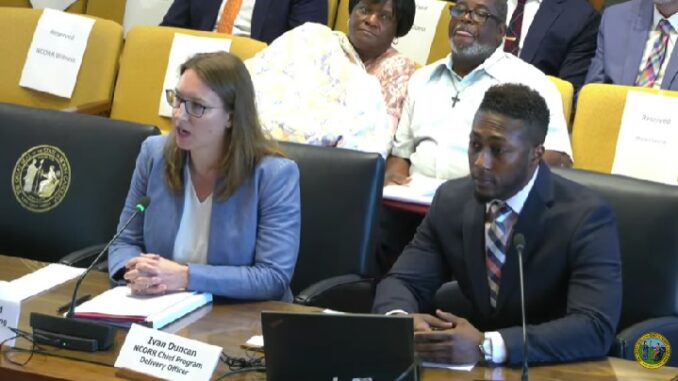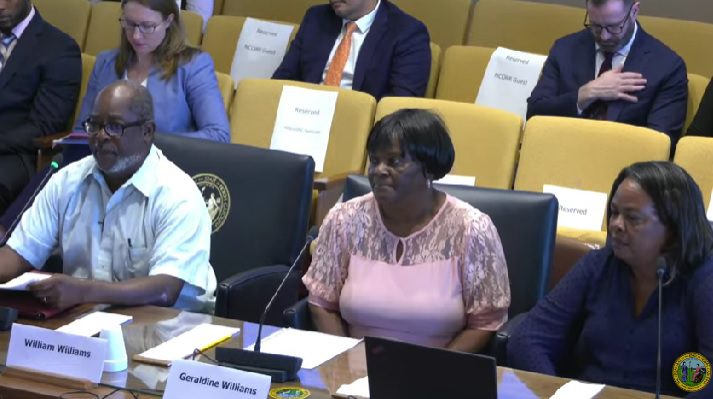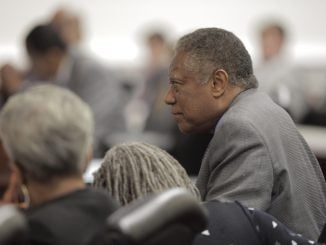
RALEIGH — On the four-year anniversary of Hurricane Florence landing on North Carolina’s shore, a legislative subcommittee met to find out why many hurricane victims still have not been made whole.
The 15-member Hurricane Recovery panel is a subcommittee of the Joint Legislative Commission on Government Operations. The formation of the subcommittee and its members were announced in July.
Hurricane victims Willie Williams and his wife Geraldine, both disabled veterans with medical issues, both became emotional at times while relating their situation to lawmakers.
“What’s done is done. You can’t change what happened in the past,” said Mrs. Williams. “It’s not about us being angry, it’s about us not being heard.”

Image taken from the General Assembly Live Stream video.
The Williams’ told lawmakers they first applied to Rebuild NC for help in repairing their home in 2019, yet they are currently still living in a hotel room.
“After so many weeks, they came back… and told us that it will be an additional two months,” Mrs. Williams said. “After that two months, they [came] back and tell us it will be an additional two months. And this went on and on up until this date.”
Mr. Williams said it felt like they were being led on and on “until it is too late.”
Another giving testimony was Lavonne Merritt, who said she and her father applied for relief in 2019. She said Rebuild NC keeps “passing the buck” meanwhile she is still waiting and her father has since passed away.
During her testimony, Merritt became tearful and said she “just wants to go home.”
Public comments submitted to the subcommittee mirrored testimony such as the recovery program having a lengthy and complicated application processes, lack of clear communication, and being passed from one person to another with no usable information offered.
Prior to hearing from some of the victims, subcommittee chair Sen. Brent Jackson opened the meeting with testimony from officials from two agencies playing a role in hurricane recovery projects; Richard Trumper of the Office of State Budget and Management Disaster Recovery (OSBM) and Laura Hogshead and Ivan Duncan of the North Carolina Office of Recovery and Resiliency (NCORR).
NCORR was established by Governor Roy Cooper in 2018 to oversee and manage the $778 million in federal disaster relief received by the state for both hurricanes Matthew (2016) and Florence (2018). The money comes from the U.S. Department of Housing and Urban Development (HUD).
Under Cooper’s control, only around 60% of those funds have been encumbered with just $231 million actually spent to date. The funds have deadlines to either be spent or encumbered by 2025 for Matthew and 2026 for Florence.
NCORR runs Rebuild NC, a program established in October 2018 to aid families impacted by Hurricanes Matthew and Florence.
Per the governor, NCORR’s purpose was to “streamline recovery programming and assistance.”
“The Office of Recovery and Resiliency has made tremendous progress in getting disaster money out to the people who need it, but recovery is always a long-term process for storm survivors,” Cooper said in a Dec. 2019 press release praising the agency.
Laura Hogshead, NCORR’s director, admitted the effort was off course and took responsibility during her opening remarks.
“This recovery is not going as you want it to go. It’s not going how I want it to go, and it’s certainly not going how the families sitting behind me and out in eastern North Carolina want it to go,” said Hogshead. “And that is on me.”
Hogshead as named director on Jan. 1, 2019. She had previously been Chief Operating Officer and Deputy Chief of Staff for Budget and Policy at the U.S. Department of Housing and Urban Development (HUD).
Her past role at HUD was raised several times by lawmakers in relation to why she only began to make changes to policies regarding contractors and applications in the last six month.
Hogshead said the pandemic was partly to blame for the lack of progress.
Lawmakers on the subcommittee were unreceptive to the excuses offered and Sen. Danny Britt (R-Robeson) was particularly sharp in some of his remarks.
Addressing Hogshead, Britt said, “You and I have talked a lot and you know what is happening is unacceptable. The idea the pandemic has caused the backlog is ridiculous to me.”
Britt went on to say, “Everything that [NCORR] has done thus far has been unacceptable… we need to do better to help these folks.”
Rep. Brenden Jones (R-Columbus) also grilled Hogshead for quite a while, ending his questioning by asking her, “What would you say to those who have died and never get to go home?”
“There’s nothing I can say to them,” Hogshead replied.
Hogshead’s presentation showed 4,100 applications taken since federal funds were received, but only 789 projects have been completed.
According to her testimony, NCORR’s current rate of construction is between five to six houses per month. Hogshead indicated the rate in 2020 was twenty-eight a month but following the pandemic in 2021 that rate dropped to fourteen a month.
She added that around 1,100 applicants are currently either waiting to find a contractor willing to do the work or for work to begin. Additionally, 294 applicants are still living in temporary housing situations such as hotels or rental properties.
Rep. Sarah Stevens grilled Hogshead on the lack of progress, and asked “So, we are building 1,000 homes in the same time it took to help 789 people?
“Yes,” replied Hogshead.
Jackson and other legislators expressed concerned the work won’t get done by the 2025 and 2026 deadlines.
“Now we’re in a hole so deep that, quite frankly, I don’t think you or your staff can dig yourself out of it,” Jackson said to Hogshead.
“You would need a 600% increase in output to meet the Florence deadline, right?” Britt asked and Hogshead responded with a “yes.”
During questioning, Sen. Jarvis asked Duncan what percentage of NCORR’s 300 employees were out actually checking on site progress. Duncan replied 20. Under further questioning it was revealed that perhaps only one of the 20 had any general contracting experience.
A company called HORNE, which has been providing project management services related to the federal relief funds, supplied a memo at the request of the subcommittee detailing their involvement and issues with working with NCORR staff.
The HORNE memo says they had made “numerous attempts to recommend best practices” but that NCORR rarely implemented them and many of those attempts “were met with criticism.”
HORNE’s memo also indicated NCORR had limited its ability to talk to construction management and related state agencies, and that “The case management team was limited in its ability to provide substantive updates and support to applicants.”
“As I sit here today and read the comments submitted from survivors talking about delays, lack of communication, and red tape, and then look out across this room and see the anguish on some of these faces, these could have been avoided if NCORR had just focused on helping our citizens instead of winning imaginary bureaucratic gold stars,” Jackson said following the discussion of the HORNE memo.
In the final segment of the hearing, lawmakers heard testimony from Col. J.R. Sanderson of the St. Bernard Project, a nationwide disaster recovery organization.
The St. Bernard Project ran South Carolina’s Disaster Recovery Program from 2015 to 2019.
Sanderson testified the program in South Carolina used a streamlined system using one vendor to assign contractors to housing projects. Under that program, contractors could be fined up to $100 a day for work not completed on time.
That process used in South Carolina resulted in an average turnaround time of 37 days for mobile homes, 56 days for stick-built, and 88 days for complete reconstruction. Additionally, Sanderson said they were able to turn over 110 homes a month or an average of 3-5 per week.
Lawmakers asked Sanderson about NCORR’s progress, and he indicated he did not believe that they will meet the federal deadlines and action should be taken to contract out NCORR’s management system.
The subcommittee will meet again in 90 days on Dec. 14 and will expect a status update on NCORR.




